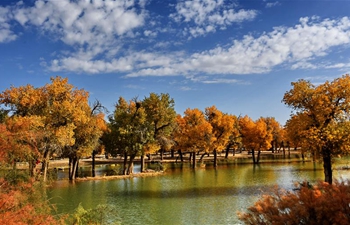SYDNEY, Oct. 29 (Xinhua) -- A team of Australian-led researchers have used genetic analysis, geographic data and climatic physics to narrow down the exact location where modern human life began.
The study published in Nature on Tuesday suggests anatomically modern people first originated in southern Africa around 200,000 years ago, south of the Zambezi River Basin.
While archeologists and other scientific disciplines have long believed the first Homo Sapiens came from East Africa, the new findings indicate the earliest human ancestors derived from the northern expense of Botswana, eastern Namibia and western areas of Zimbabwe.
"To truly understand our future, we must also understand our past," co-author of the study Dr Eva Chan, from the Garvan Institute of Medical Research told Xinhua.
"So we went into Southern Africa to identify individuals who were likely to have rare lineages, including some of the world's oldest population groups -- the KhoeSan."
"At the same time we trolled through the world's biggest genomic database, NCBI (National Center for Biotechnology Information), looking for these rare lineages (often referred to by scientists as L0)."
Using genetic sequencing, the team was able to identify 198 genomes belonging to these ancient lineages, then, by combining a further 1,000 genomes found in the database, researchers could refine phylogenetic time estimates to better understand where human life began.
"With time DNA changes like a clock, every generation that goes by there is a change but you inherit that change and you pass that change onto your child," study lead Professor Vanessa Hayes, also from the Garvan Institute of Medical Research, explained to Xinhua.
"So that clock, we can move backwards in time and say, how long ago did two people share a common ancestry?"
"If it's a mum and their child, the answer is right there. It's exactly the same mitogenome. But you can also take me today and a KhoeSan living in the Kalahari and say when did we share a common ancestor? When were our mitogenomes exactly the same? And that was 200,000 years ago."
In order to cross-reference the genetic tests, the study investigated geological, archeological and fossil evidence to understand what the climate would have been like during this period.
Although the region is now mainly desert and largely inhospitable, at the time, the Makgadikgadi-Okavango palaeo-wetland of Southern Africa was a lush, green paradise which was previously home to Africa's largest-ever lake.
"Prior to modern human emergence, the lake had begun to drain due to shifts in underlying tectonic plates," geologist involved in the study, Dr Andy Moore from Rhodes University in South Africa said.
"This would have created, a vast wetland, which is known to be one of the most productive ecosystems for sustaining life."
With a stable ecological environment that allowed these early humans to thrive for around 70,000 years, researchers believe the first migrations North and further South were driven by climate.
"We observed significant genetic divergence in the modern humans' earliest maternal sub-lineages, that indicates our ancestors migrated out of the homeland between 130 and 110 thousand years ago," Hayes said.
"The first migrants that ventured northeast, followed by a second wave of migrants who travelled southwest. A third population remained in the homeland until today."
While the groundbreaking findings are expected to shed a great deal of light on the past, Hayes hopes the study will also provide key information about future.
"To understand the genetic differences that lead to disease, we need to understand the genetic differences that actually made us healthy and able to survive 190,000 years as hunter-gatherers," Hayes said.
"So if we came from Southern Africa and spent at least 70,000 of those years in Southern Africa, we really need to understand what it was genetically that made us so strong."













